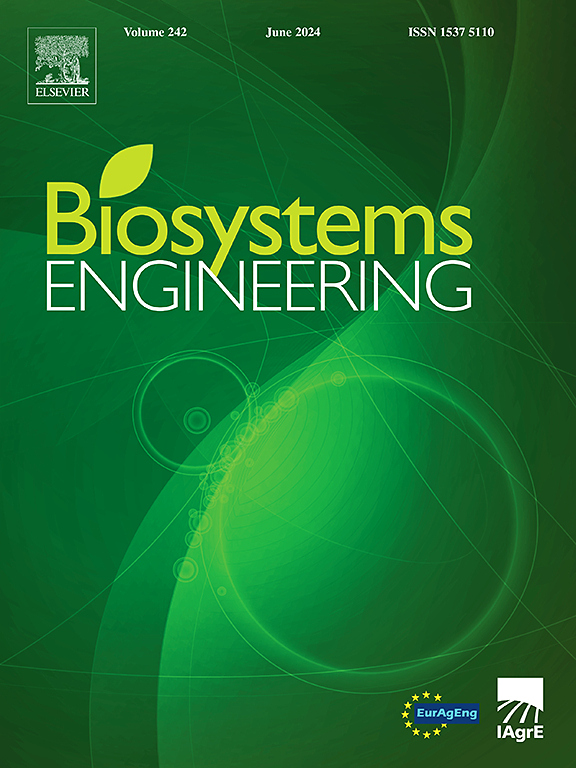Scaled experimental study of a ventilation system featuring partition jet and pit exhaust
IF 4.4
1区 农林科学
Q1 AGRICULTURAL ENGINEERING
引用次数: 0
Abstract
In the context of current intensive livestock farming development, we present a novel energy-efficient ventilation method, named as the partition jet and pit exhaust (PJPE) system, for multi-story pig facilities. The objective is to overcome the limitations of traditional ventilation methods, e.g., mixing ventilation sidewall air supply or tunnel ventilation, in managing heat stress and air quality. Isothermal and non-isothermal experiments were conducted in a 1:2.5 scaled pig pen model to study the airflow distribution characteristics and ventilation effectiveness of the PJPE system. The results demonstrate that the PJPE system enables rapid delivery of fresh air to the animal-occupied zone (AOZ). With the Archimedes numbers (Ar) of supply air ranging between 0.0025 and 0.0052, the jet maintains low air temperatures near the pig's back. Compared to traditional pig house ventilation methods, the PJPE demonstrates better heat removal efficiency (HRE), with an average HRE of 1.20. Additionally, the PJPE effectively inhibits the upward diffusion of ammonia from the slurry pit. These findings indicate that the PJPE system presents a viable, energy-efficient alternative for environmental control in high-density pig housing, highlighting its potential for advancing animal welfare and productivity in intensive livestock farming.
分区喷气和坑式排气通风系统的比例实验研究
在当前集约化畜牧业发展的背景下,我们为多层养猪设施提出了一种新型节能通风方法,即分区喷气和坑式排气(PJPE)系统。其目的是克服传统通风方法(如混合通风侧壁送风或隧道通风)在管理热应力和空气质量方面的局限性。为研究 PJPE 系统的气流分布特性和通风效果,在 1:2.5 比例的猪栏模型中进行了等温和非等温实验。结果表明,PJPE 系统能快速向动物占用区(AOZ)输送新鲜空气。由于送风的阿基米德数(Ar)介于 0.0025 和 0.0052 之间,喷气机能在猪背附近保持较低的空气温度。与传统的猪舍通风方法相比,PJPE 显示出更高的热去除效率(HRE),平均 HRE 为 1.20。此外,PJPE 还能有效抑制泥浆池中氨气的向上扩散。这些研究结果表明,PJPE 系统为高密度猪舍的环境控制提供了一种可行的节能替代方案,凸显了其在集约化畜牧业中提高动物福利和生产率的潜力。
本文章由计算机程序翻译,如有差异,请以英文原文为准。
求助全文
约1分钟内获得全文
求助全文
来源期刊

Biosystems Engineering
农林科学-农业工程
CiteScore
10.60
自引率
7.80%
发文量
239
审稿时长
53 days
期刊介绍:
Biosystems Engineering publishes research in engineering and the physical sciences that represent advances in understanding or modelling of the performance of biological systems for sustainable developments in land use and the environment, agriculture and amenity, bioproduction processes and the food chain. The subject matter of the journal reflects the wide range and interdisciplinary nature of research in engineering for biological systems.
 求助内容:
求助内容: 应助结果提醒方式:
应助结果提醒方式:


